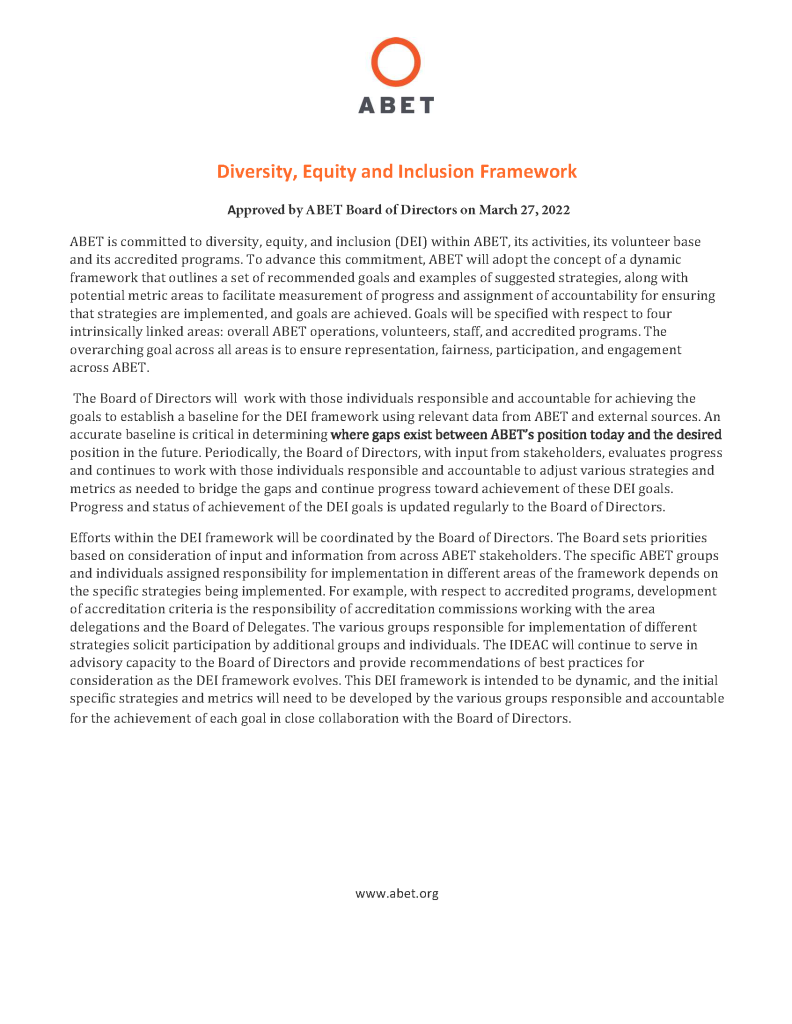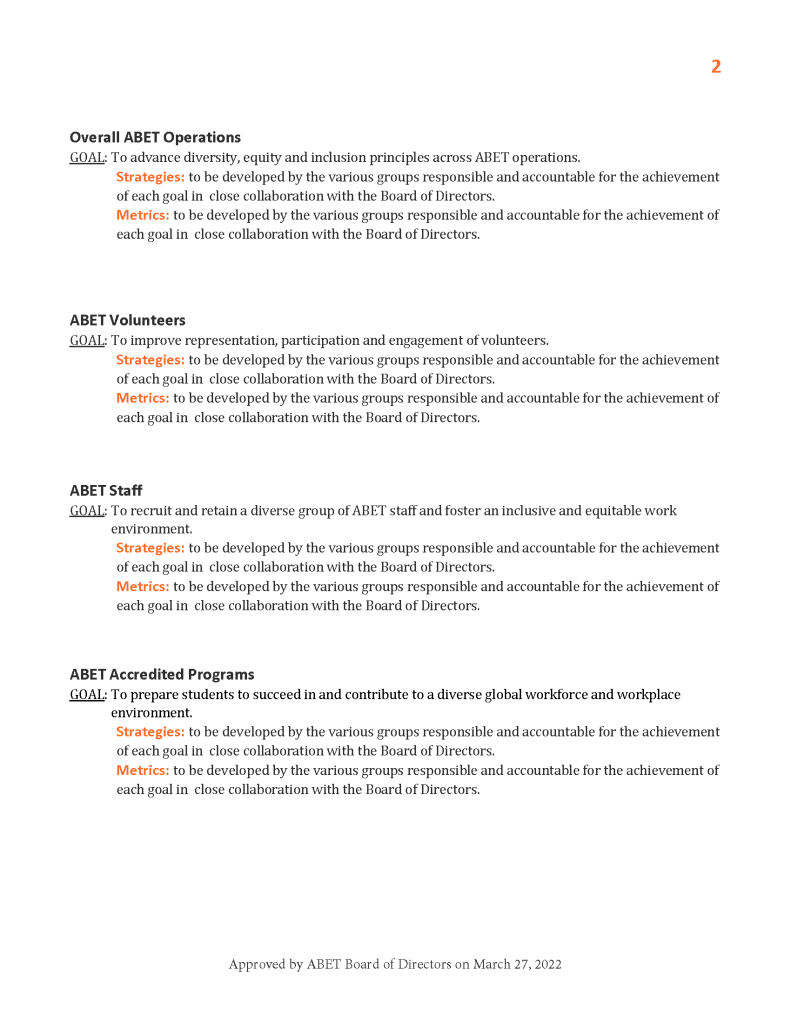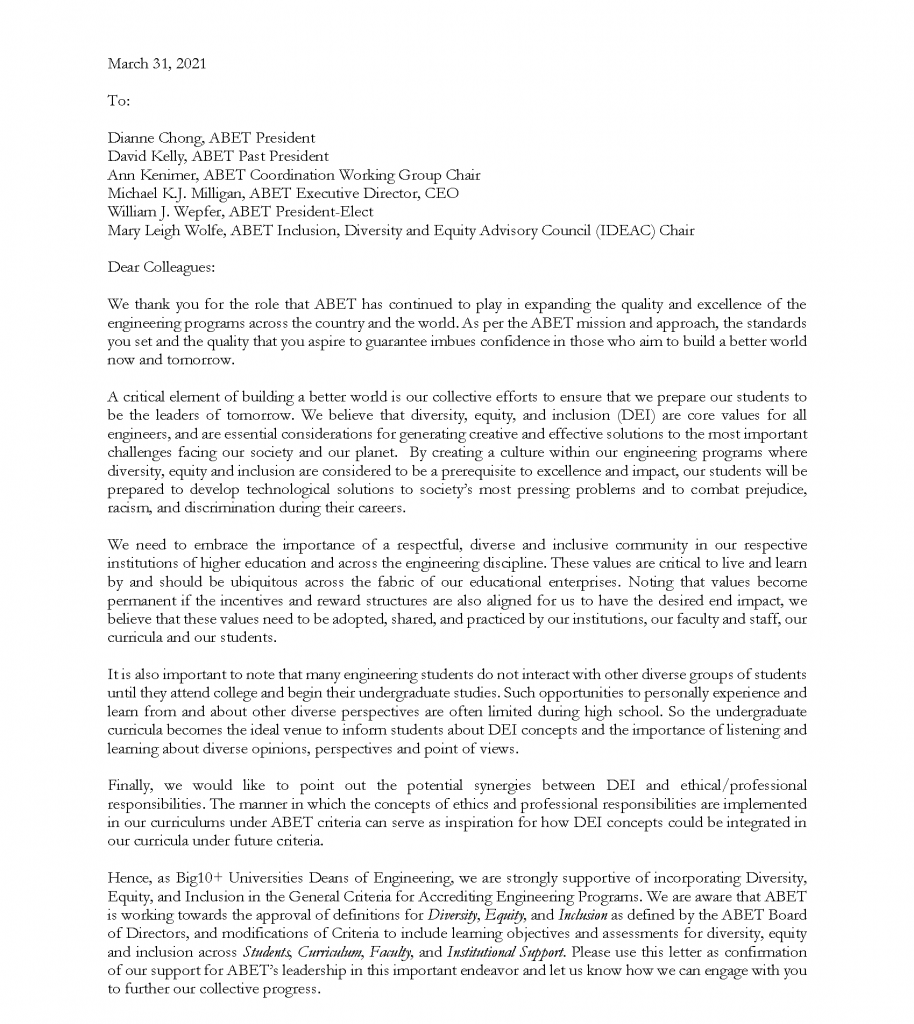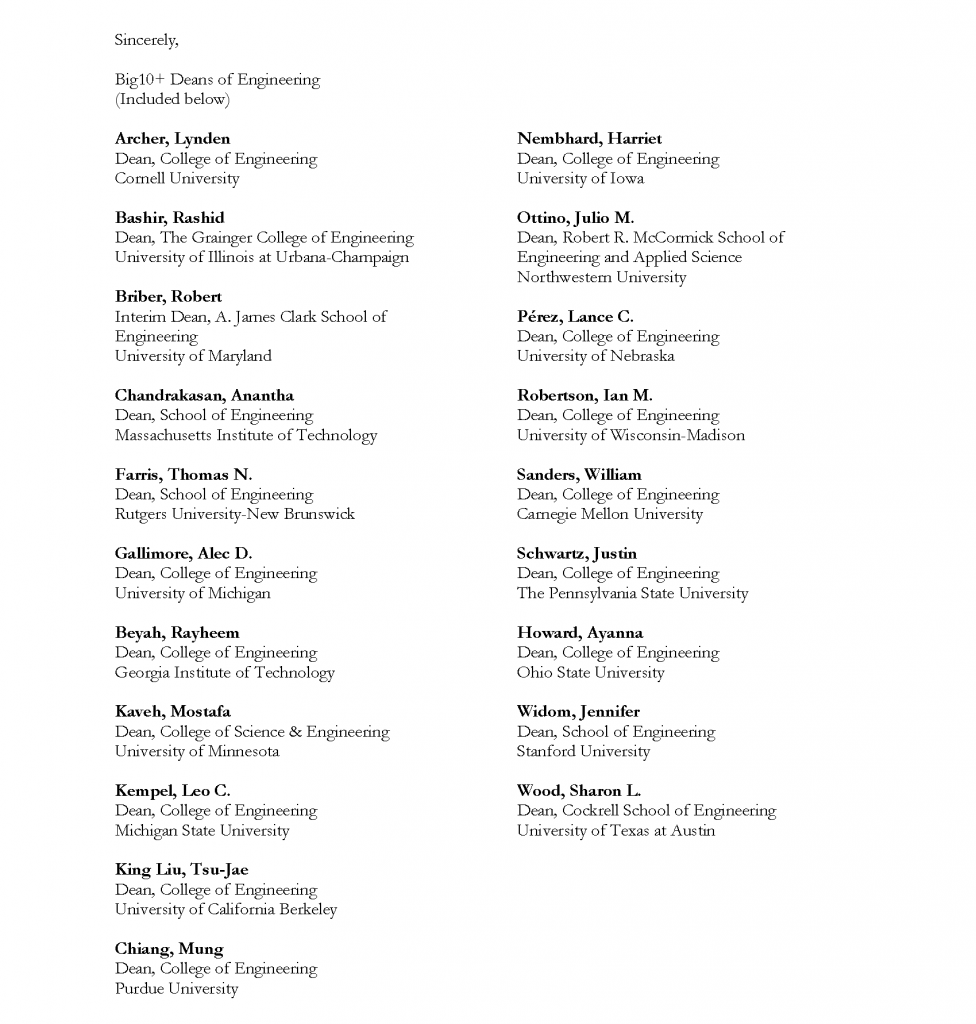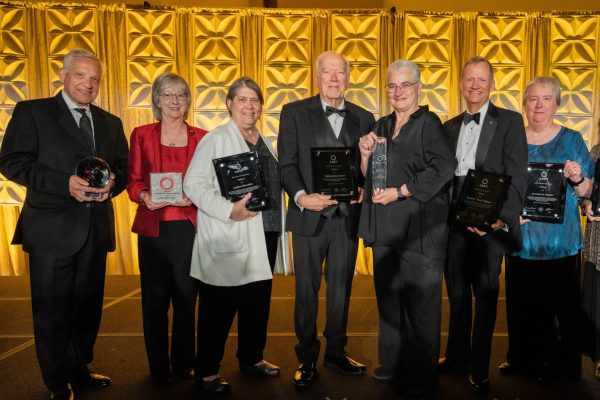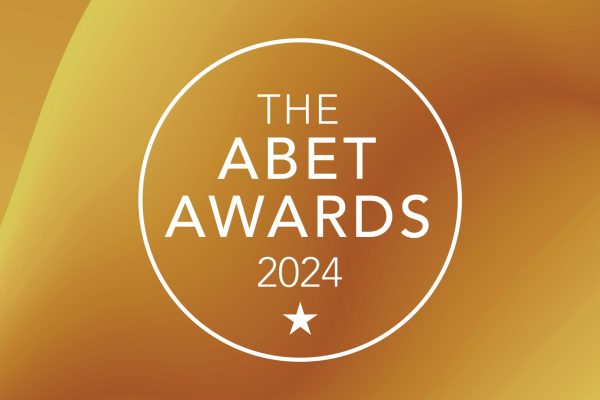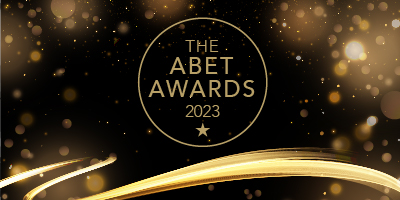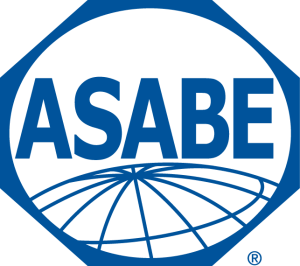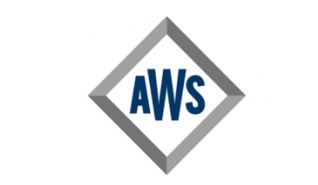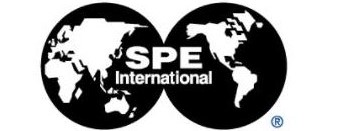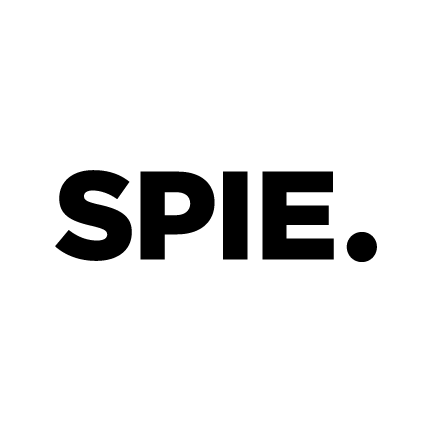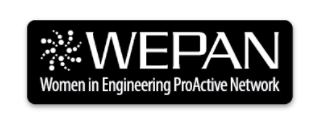Inclusion, Diversity, Equity & Accessibility
ABET staff, volunteers and leadership are committed to the principles of inclusion, diversity, equity and accessibility through global leadership in STEM education, incorporating the highest standards of professional integrity, dignity, fairness, justice and respect for everyone.
This page includes information and resources related to ABET’s initiatives in this important area.
ABET’s Inclusion, Diversity, Equity and Accessibility Advisory Council
Reporting to the Board of Directors, the Inclusion, Diversity, Equity and Accessibility Advisory Council (“the IDEA Council”) promotes inclusivity, diversity, equity, and accessibility within ABET, its activities, its volunteer base, and its accredited programs.
Inclusion, Diversity, Equity and Accessibility Dynamic Framework
Approved by the ABET Board of Directors
ABET is committed to inclusion, diversity, equity, and accessibility within ABET, its activities, its volunteer base, staff, operations and its accredited programs. To advance this commitment, ABET adopted the concept of a dynamic framework (i.e., evolving, living document) that outlines a set of recommended goals and examples of suggested strategies, along with potential metric areas to facilitate measurement of progress and assignment of accountability for ensuring that inclusive, diverse, equitable and accessible strategies are implemented, and goals are achieved. The overarching goal across all areas is to ensure representation, fairness, participation, and engagement across ABET.
-
Full Inclusion, Diversity, Equity and Accessibility Dynamic Framework
Definitions: Establishing Common Language
The following definitions have been approved by the ABET Board of Directors and serve as a reference point for our conversations and materials about inclusion, diversity, equity and accessibility.
-
Inclusion
Inclusion is the intentional, proactive, and continuing efforts and practices in which all members respect, support, and value others.
-
Diversity
Diversity is the range of human differences, encompassing the characteristics that make one individual or group different from another. Diversity includes, but is not limited to, the following characteristics: race, ethnicity, culture, gender identity and expression, age, national origin, religious beliefs, work sector, physical ability, sexual orientation, socioeconomic status, education, marital status, language, physical appearance, and cognitive differences.
-
Equity
Equity is the fair treatment, access, opportunity, and advancement for all people, achieved by intentional focus on their disparate needs, conditions and abilities.
-
Accessibility
Accessibility is the design, construction, development, and maintenance of facilities, information and communication technology, programs, and services so that all people, including people with disabilities, can fully and independently use them.
Statements on Diversity, Equity, Inclusion and Accessibility
-
ABET's Statement on Implementing DEI Concepts into Program Criteria
Over the course of the past several years, we have developed accreditation criteria and processes for ensuring Diversity, Equity and Inclusion (DEI) is part of each student’s educational experience.
ABET remains committed to the basic principles of advancing diversity, equity, inclusion and accessibility:
-
- We believe that understanding, embracing and prioritizing inclusion, diversity and equity in higher education is critical to competitiveness, innovation, and our global pursuit of a more sustainable world.
-
- We believe that all components of modern society should recognize human equity as a fundamental human right. We must begin working collectively through STEM education to build a fair and better system that does not discriminate.
-
- Consistent with all aspects of our accreditation process, we respect all aspects of an academic institution’s mission.
Only together can we achieve real change by supporting our goal as an organization.
However, several state legislatures have recently proposed or passed laws restricting or prohibiting accrediting organizations from including DEI as part of the accreditation process. Although ABET’s criteria are not directly impacted by the current laws passed we are aware of the stress this has created and the potential for our criteria to be impacted by future legislation.
Despite this recent activity, we remain fully committed to advancing our DEI goals for higher education. As an organization focused on “making the world a better place,” ABET believes that we can only address the many complex challenges facing our society through a welcoming, diverse and inclusive environment.
Our original plan was to implement DEI concepts into our criteria for academic programs undergoing reviews in the 2024-25 accreditation cycle (Computing Accreditation Commission (CAC)) and the 2025-26 cycle (Engineering Accreditation Commission (EAC)) in addition to current language in our Engineering Technology Accreditation Commission (ETAC) criteria. In preparation, we are conducting a “pilot” study of accreditation reviews that include DEI criteria in both the 2023–24 and the 2024–25 cycle. Forty institutions (185 programs) from six countries volunteered to participate in this study being conducted by the EAC. Participation in this pilot study is optional, and data gathered from the DEI portion of the reviews will be used for informational purposes only, and not as the basis of any accreditation decisions for these programs. (Additionally, any institution may exit the DEI elements of this pilot at any point during or prior to these reviews.)
We will continue to learn from these efforts while demonstrating our unwavering and unambiguous commitment to diversity, equity and inclusion (DEI) within ABET, its activities, its volunteer base, staff, operations and its accredited programs. Our approach, the standards we set and the quality we guarantee, inspires confidence in those who aim to build a better world — one that is safer, more efficient, more inclusive and more sustainable.
Meanwhile, to avoid potential conflicts with recent legislation and to ensure we are not placing any institution at legal risk, we are reexamining our original plan for full implementation of the DEI criteria. We expect a decision to be made by November 2023.
-
-
ABET Statement of Support for Afghan Women and Girls
January 10, 2023
ABET is an advocate for inclusive and equitable education for all, and we are deeply troubled by the Taliban’s recent actions in Afghanistan to ban women from attending universities and girls from attending secondary school. This action violates a basic premise of Article 26 of the United Nations’ Universal Declaration of Human Rights: Everyone has the right to education.
STEM professionals play a critical role in developing solutions to make the world a better place — one that is safer, more efficient and more sustainable. Our workforce must be comprised of people from diverse backgrounds, perspectives and personal experiences. The education of women and girls is essential to ensuring their own futures and the prosperity of their families, as well as the future of our communities and, ultimately, our planet.
ABET supports gender equity in education and in the STEM fields unequivocally, and we fully support the fundamental rights of Afghan women and girls to receive access to quality education.
S. K. Ramesh
2022-23 PresidentMichael K. J. Milligan
Executive Director and CEOHamid Fonooni
2022-23 President-ElectRichard Olawoyin
2022-23 IDEA Council ChairWilliam J. Wepfer
2022-23 Past President -
ABET Statement of Support for the Asian and AAPI Communities
March 24, 2021
Over the past year, the United States has experienced an increase in acts of xenophobia, racism, harassment and violence against the Asian and Asian-American and Pacific Islander (AAPI) communities. From inflammatory rhetoric related to the COVID-19 pandemic’s location of origin, to the recent fatal shooting of eight people in Atlanta, six of whom were of Asian descent, these acts of intolerance and escalation in violence must be addressed.
We condemn these attacks and stand in solidarity with the Asian and AAPI communities.
As a global leader in STEM education, we work to incorporate the highest standards of professional integrity, dignity, equity, fairness, justice and respect for everyone into our principles and practices. We encourage all our member societies and our professional community to stand up and speak out, unite against racism and injustice and take actionable steps to build a more inclusive and equitable society.
If you or your organization would like to share and/or collaborate on actionable steps we can implement in support of the Asian and AAPI communities, please contact ABET’s Inclusion, Diversity and Equity Advisory (IDEA) Council at IDEA@abet.org.
Dianne Chong
2020-21 PresidentWilliam J. Wepfer
2020-21 President-ElectDavid P. Kelly
2020-21 Past PresidentMichael K. J. Milligan
Executive Director
and CEO -
ABET’s Commitment to Support Anti-Racism and Justice
June 15, 2020
The long history of systemic oppression, stigmatization, criminalization and injustice of Black people and other minority communities have created a society with two unequal realities. The Black Lives Matter movement speaks directly to systemic racism, systemic inequalities with access to education, health care and opportunities, and the persistent devaluing of Black lives due to past and current discrimination and bias, practices, policies, procedures and laws.
ABET stands in solidarity with the Black Lives Matter movement to end systemic racism. This is consistent with our core values and commitment to inclusion, diversity and equity.
ABET believes that all components of modern society must recognize and prioritize equity and justice as fundamental human rights, and Black lives do matter. We all must begin working collectively through STEM education to build a fair and better system that does not discriminate against Black people and other communities of color.
ABET understands that as our concern for each other has never been more important, our voices as leaders in STEM must be used to drive positive change and call on others to do the same.
ABET encourages all member societies and our professional community to stand up and speak out, unite against racism and injustice and take actionable steps to engage, dialogue and build a more inclusive and equitable society.
Our diverse humanity is our greatest asset. It is time for our collective practices, procedures, policies, regulations, standards and laws to reflect our priorities and drive for accountability around inclusion, diversity, equity and justice across the STEM community.
ABET is confident that, together, we can make a difference by using our collective assets to solve complex challenges in laboratories, workplaces, communities and our personal spaces.
ABET is committed to this change through global leadership in STEM education, incorporating the highest standards of professional integrity, dignity, equity, fairness, justice and respect for everyone.
To provide space for discussion on this topic, ABET’s IDEA Council (IDEA@abet.org) would like to hear from you about suggestions, comments and actionable examples you and your constituencies are implementing in support of the Black community.
David P. Kelly
2019-20 PresidentMary Leigh Wolfe
2019-20 Past PresidentDianne Chong
2019-20 President-ElectWilliam J. Wepfer
2020-21 President-ElectMichael K. J. Milligan
Executive Director
and CEO -
ABET’s Commitment to Positive Change
June 6, 2020
The recent events across the United States have painfully affected all our communities.
As an organization that focuses on STEM accreditation, ABET believes that education and lifelong learning are ways through which we bring change to the world. We exist to provide confidence that graduates of programs in the applied and natural science, computing, engineering and engineering technology professions are prepared to enter an increasingly diverse and global workforce.
When we honor and respect our differences, we strengthen our ability to solve some of the most pressing and increasing global challenges — inequality, peace and justice, quality education, poverty, hunger, and climate change, among the challenges outlined in the United Nations Sustainable Development Goals.
STEM professionals play a critical role in designing solutions to make the world a better place — one that is safer, more efficient and more sustainable — and to develop solutions that benefit the lives of all people. Our workforce must be comprised of people from diverse backgrounds, perspectives and personal experiences. We must be intentional and proactive in creating environments that respect and embrace our differences and carefully examine historical and systemic patterns of disparity to address and eliminate barriers to achieving social justice.
We recognize there is much work to be done, and the members of the ABET community — our staff, volunteers and leadership — stand committed to our value of continuous improvement. We will work tirelessly to identify and implement solutions that support the goals of fair treatment, equitable access, opportunity and advancement for all people.
The problems we face are not isolated to one group or one community — they are everyone’s problems, and we must all be part of the solution. ABET expresses our deepest and heartfelt commitment to positive change and human progress.
David P. Kelly
2019-20 PresidentMichael K. J. Milligan
Executive Director and CEO
Big 10+ Universities Deans of Engineering Letter of Support
On March 31, 2021, we received a letter of support from the Big 10+ Universities Deans of Engineering regarding the incorporation of diversity, equity and inclusion principles into ABET’s General Criteria for Accrediting Engineering Programs.
-
Click here to read the letter
Recent News
2021 ABET Symposium Diversity, Equity, Inclusion and Accessibility Session Recordings
Barriers to Implementing IDE in the Workplace: Raising Awareness of Educators and Students
Panelists discuss existing and emerging issues that are, or may become, barriers to the implementation of inclusion, diversity and equity in the workplace environment, as well as approaches to raise awareness of such challenges in preparing graduates to enter the workforce.
Encouraging the Retention of Women in Engineering
Despite the increasing efforts to keep young women interested in STEM before college, once there, a sizeable number of them will still end up leaving engineering majors for non-STEM related fields. This session discusses a variety of possible approaches for the retention of women in engineering and explores the outcomes and impact of those programs.
Evolving Global IDE Landscape in the Workplace and Workforce: Impact on Student Preparation
Panelists describe the developing landscape with respect to inclusion, diversity and equity (IDE) in the workplace and workforce in their regions of the world, as well as educational responses to a changing workplace environment.
Additional Resources
ASCE’s Diversity, Equity & Inclusion page includes news and resources such as videos, reports and articles, as well as strategic partners and alliances and more.
ASABE has a history of being a diverse and strong organization. Diversity enriches and builds upon the educational experience and improves the practice of engineering.
The American Society of Mechanical Engineers’ page includes a podcast, videos, statements from the CEO and information about the Women in Standards & Certification (WiSC) initiative.
ASEE’s Commission on Diversity, Equity & Inclusion site offers articles, newsletters and reports, session materials, workshops, awards information and more.
The American Welding Society’s initiatives include the society’s Diversity & Inclusion Committee and the AWS Future Leaders Program.
The BME Organizations Leading Diversity (BOLD) initiative coordinates a national, BME community response to the longstanding racism in our nation.
The Construction Management Association of America provides a statement of values, policy framework, code of professional conduct and a committee on diversity, equity & inclusion.
IEEE resources and guidelines include a code of ethics, virtual user experience lab accessibility tools, best practice videos, IEEE society initiatives and more.
IISE values and celebrates the diversity of participants in the Industrial and Systems Engineering (ISE) profession worldwide and the stakeholders who benefit from the contributions of these professionals.
The National Society of Professional Engineers offers articles, a list of activities and interviews with members of the NSPE Diversity, Equity, and Inclusion Advisory Committee.
The Society of Petroleum Engineers’ Diversity & Inclusion Committee works to advance the society’s commitment to diversity and inclusion through advocacy, collaboration and education.
SPIE provides news and events, community resources, information about Women in Optics, a best practices toolkit and more.
The Society of Women Engineers is the world’s largest advocate and catalyst for change for women in engineering and technology. SWE offers a variety of resources, such as workbooks, card decks and eLearning courses.
The TMS Diversity & Inclusion Committee seeks to advance TMS’s commitment to diversity, equity and inclusion in the minerals, metals and materials science and engineering fields.
WEPAN is the nation’s first network dedicated to advancing cultures of inclusion and diversity in engineering higher education and workplaces. This site offers culture-transforming projects and professional development.

